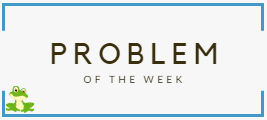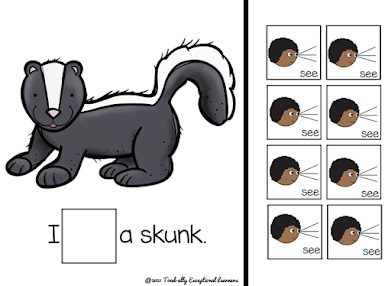POW: Readers Needing More Support--Adapted Books with High Frequency Words
How do I get my readers more exposure to high-frequency or Red Words???
ADAPTED BOOKS
I love adapted books. My students LOVE them too! They are one of my favorite tools in my classroom. When it comes to building language skills or more experience with text--adapted books are a great way to effectively target specific skills in a way that is engaging for students.
What is an Adapted Book?
Adapted books are books that have been modified in some way and often make it easier for students with disabilities to use but I also find adapted books are more engaging for all students to read and target so many critical language skills. I create and use adapted books all the time because they are interactive, motivating, and target various language skills. Many allow the students to feel successful and part of the book because they have to add or move pieces within the book.
Why You Need Adapted Books?
Research tells us kids with severe and profound disabilities often get sub-par literacy instruction. Part of that is based on people’s assumptions about the abilities of students with complex disabilities, the idea that instructional materials should only focus on functional or sight word instruction, and fact that language skills are generally lacking for students in this population. The other part of that is a feeling that instructional materials are just not made for these students in a way that is accessible.
There are a couple of big targets you are trying to hit when you add adapted books or novels to your classroom and lessons. One of them is to increase a student’s access to literature. You would be amazed at how many classrooms have NO appropriate reading materials in their classrooms. Because our students take longer to learn new skills, available literature tends to be juvenile or fully functional.
It is imperative students with severe disabilities are exposed to developed ideas and advanced concepts as a means of improving overall literacy and adapted books are the perfect vehicle to do that.
Adapted books can vary in skill level and be used for a wide variety of students with different skill sets and literacy skills. Many times there are pictures associated with the vocabulary terms so it provides those extra visual supports to help with understanding and comprehension of the verbal message. As the books become more challenging students rely less on pictures and more on written words.
What is a High-Frequency Adapted Book?
Predictable texts are a specific type of book used in the earliest stages of reading instruction. It provides students with more frequent exposure to the targeted word. The texts have a repeated sentence or phrase on each page, typically with one variable word. A picture accompanies each sentence that allows the student to guess the variable word using the picture.
Errorless teaching is an instructional strategy that ensures children always respond correctly. Each page has only one answer--the target word. This means students are getting more frequent correct exposure to the word than reading authentic text where they can guess at the word.
Why Have Visuals Tied to Text?
Visuals are consistent. Visuals allow time for language processing. Visual prompts can offer a visual image and written word to meet the needs of a variety of students’ abilities. Visuals help students see what a word means. Visuals help to build independence.
So What Should I Do?
The first thing you should do is get this FREE adapted book by clicking here! Yeah. I love my readers… a lot. This is a very simple book.
Are you wanting more???? This bundle has 7 more to help you build your student's high-frequency reading knowledge.
Chat Soon-
PS--Bundle 2 coming soon

About Me
Resource Library
Thank you! You have successfully subscribed to our newsletter.















0 comments:
Post a Comment